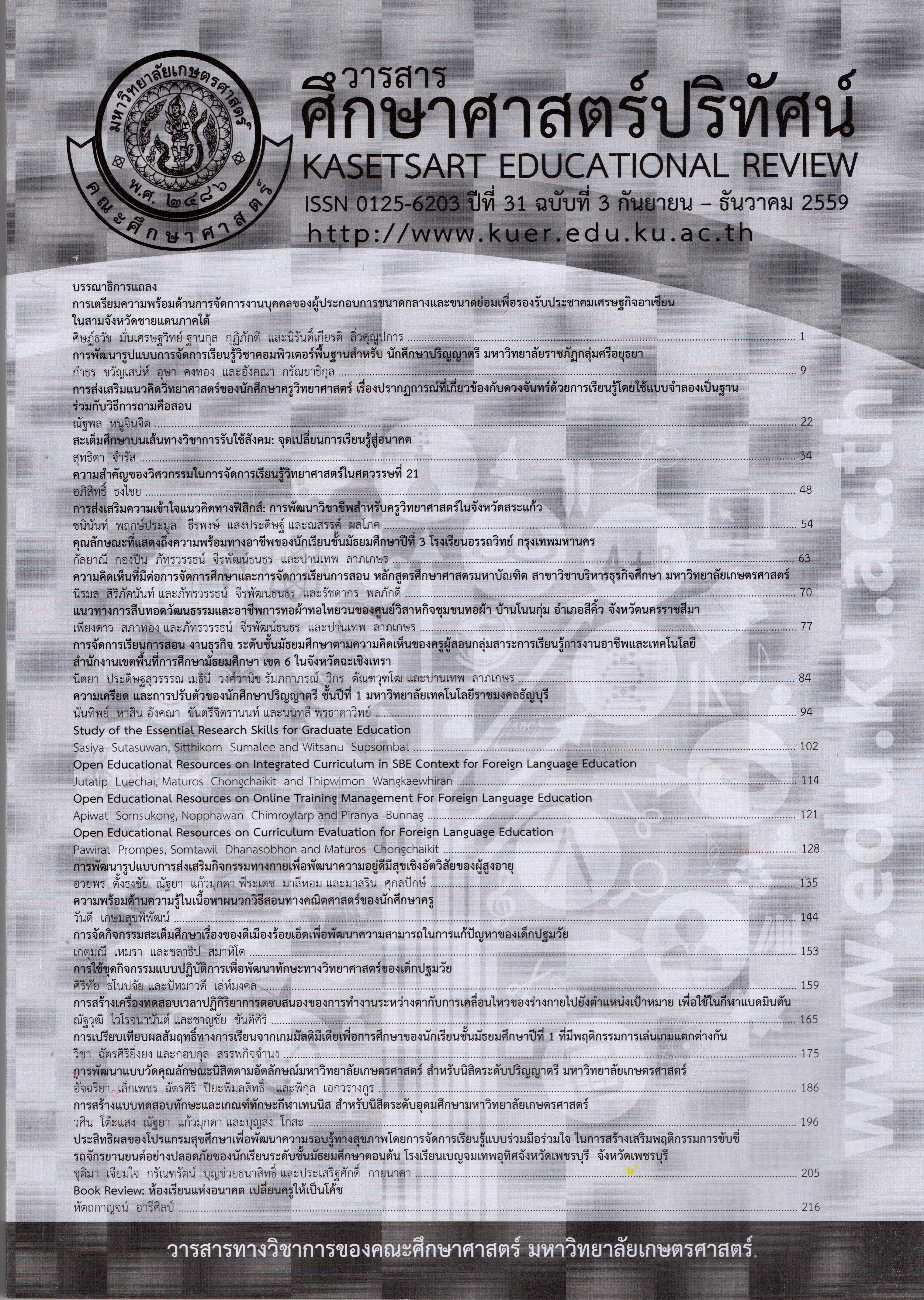Study of the Essential Research Skills for Graduate Education
คำสำคัญ:
Research Skills, Graduate Education, ทักษะทางการวิจัย, บัณฑิตศึกษาบทคัดย่อ
The purposes of this research were 1) to study the problems and needs of research skills for graduate students studying in the faculty of education from public and private universities in Bangkok; and 2) to compare the level of problems and needs of research skills for graduate students studying in the faculty of education, classified by gender, age, levels of education, types of universities, majors of study and occupation. A sample of 400 graduate students was selected from the faculty of education of public and private universities in Bangkok, the Stratified Random Sampling to compare the university’s type and Simple Random for the student’s personal information. The instruments used in this research were the problems and needs questionnaires. The data were analyzed by using descriptive statistics: frequency, percentage, mean and standard deviation, and using inferential statistics: t-test and One-way analysis of variance (ANOVA).
The research findings showed that graduate students studying in the faculty of education from public and private universities in Bangkok had encountered 1) The problems with the research skills at low level ( = 2.32): showing the top three problems with research skills were analyzing and synthesizing the literature review (
=3.03); Using the library and electronic resources for searching the related literature (
=2.79); and Collecting data from documents (
=2.79). 2) The needs of research skills at medium level (
= 2.76): showing the top three needs with research skills were analyzing and synthesizing the literature review (
=3.42); analyzing a research problem (
=3.32); and posing a research title (
=3.29). 3) difference in gender, age, levels of education, majors of study and occupation play a significant difference in problems and needs of research skills at the level of .05 whereas types of universities play no significant difference in problems and needs of research skills.
การวิจัยนี้มีวัตถุประสงค์เพื่อศึกษาและเปรียบเทียบปัญหาและความต้องการสำหรับ“การใช้ทักษะทางการวิจัยสำหรับการเรียนในระดับบัณฑิตศึกษา” จำแนกตามเพศ อายุ ระดับการศึกษา ประเภทของมหาวิทยาลัย สาขาวิชาเอกและอาชีพ กลุ่มตัวอย่างของงานวิจัยซึ่งได้จากการสุ่มแบบแบ่งชั้นภูมิ (Stratified Random Sampling) ได้แก่ นิสิตนักศึกษาคณะศึกษาศาสตร์ทั้งมหาวิทยาลัยรัฐและเอกชนในเขตกรุงเทพมหานคร จำนวน 400 คน เครื่องมือที่ใช้ในการวิจัย ได้แก่ แบบสอบถาม สถิติที่ใช้ในการวิเคราะห์ข้อมูลใช้สถิติเชิงพรรณา (Descriptive Statistics) ได้แก่ ค่าความถี่ (Frequency) ค่าร้อยละ(Percentage) ค่าเฉลี่ย (Mean) และส่วนเบี่ยงเบนมาตรฐาน (Standard Deviation) และ สถิติเชิงอนุมาน (Inference Statistics) ได้แก่ t-test และ F-test ผลการวิจัยพบว่า 1) นิสิตนักศึกษาทั้งมหาวิทยาลัยรัฐและเอกชนมีปัญหาด้านการใช้ทักษะทางการวิจัยอยู่ในระดับต่ำ ค่าเฉลี่ย 2.32 ซึ่งพบว่า การวิเคราะห์และสังเคราะห์เอกสารและงานวิจัยที่เกี่ยวข้อง การสืบค้นข้อมูลเอกสารและงานวิจัยที่เกี่ยวข้อง และการรวบรวมข้อมูลจากเอกสาร มีปัญหามากที่สุดใน 3 อันดับแรก 2) นิสิตนักศึกษาทั้งมหาวิทยาลัยรัฐและเอกชนมีความต้องการด้านการใช้ทักษะทางการวิจัยอยู่ในระดับปานกลาง ค่าเฉลี่ย 2.79 ซึ่งพบว่าการวิเคราะห์และสังเคราะห์เอกสารและงานวิจัยที่เกี่ยวข้อง การวิเคราะห์สาเหตุของปัญหาการวิจัย และการตั้งชื่อเรื่องงานวิจัย มีความต้องการมากที่สุดใน 3 อันดับแรก 3) นิสิตนักศึกษาที่มีความแตกต่างทางด้านเพศ อายุ ระดับการศึกษา สาขาวิชาเอก และอาชีพ มีปัญหาและความต้องการใช้ทักษะทางการวิจัยที่ต่างกัน อย่างมีนัยสำคัญทางสถิติที่ระดับ .05 และนิสิตนักศึกษาที่อยู่ในประเภทของมหาวิทยาลัยแตกต่างกัน ไม่มีปัญหาและความต้องการใช้ทักษะทางการวิจัยที่ต่างกัน
Downloads
ฉบับ
บท
License
บทความทุกบทความเป็นลิขสิทธิ์ของวารสารคณะศึกษาศาสตร์ มหาวิทยาลัยเกษตรศาสตร์ วิทยาเขตบางเขน
วารสารศึกษาศาสตร์ปริทัศน์ (Kasetsart Educational Review)





